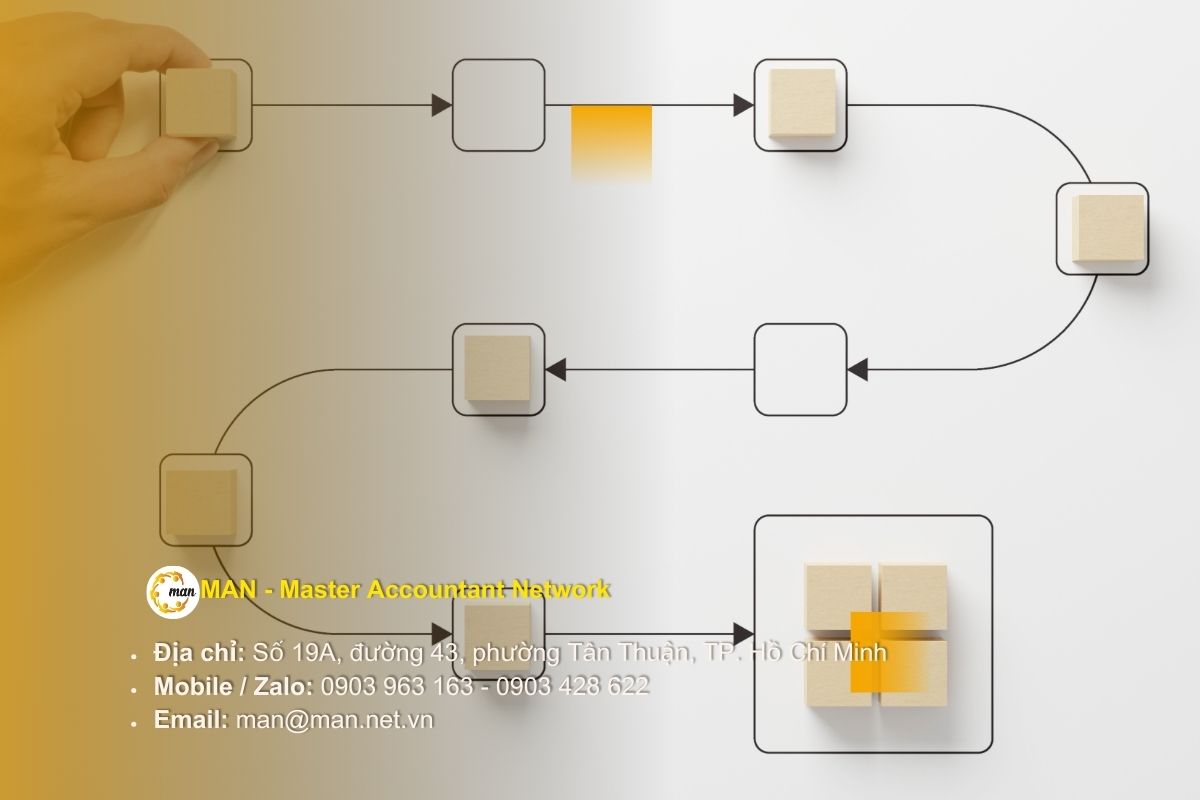Preparing CbCR reports in related party transactions is not only to comply with the provisions of Decree 132/2020/ND-CP and OECD standards, but also to measure the transparency and tax responsibility of enterprises. Correctly understanding and completing CbCR reports will help multinational corporations minimize legal risks, while creating sustainable competitive advantages in international tax management.
Concept of CbCR reporting in related party transactions (Country-by-Country Report)
Generate CbCR reports in affiliate transactions (Country-by-Country Report) is when a multinational enterprise with a parent company in Vietnam or having a declaration obligation according to regulations must compile and submit a report to the tax authority.
The meaning and role of CbCR reporting in tax management and related party transactions
Filing CbCR reports in related party transactions is not only a compliance procedure but also an important tool to help tax authorities and businesses have a transparent and comprehensive view of the operations of multinational corporations. This report reflects in detail the revenue, profit, taxes paid, number of employees, as well as the nature of operations of each member company in different countries. Thanks to that, tax authorities can assess transfer pricing risks, detect profit shifting behavior, and ensure fairness in the allocation of tax obligations between countries.
For businesses, preparing CbCR reports in related-party transactions also brings benefits in enhancing transparency, strengthening trust with investors and partners, and limiting legal and financial risks when being inspected and audited. In the context of global economic integration, complying with international standards. Preparing CbCR reports in related-party transactions is an indispensable part of a sustainable tax management strategy and the reputation of the business.
Example: A multinational corporation prepares CbCR reports on related party transactions, with an ultimate parent company in Singapore and subsidiaries operating in Vietnam, Singapore and Japan. In fiscal year 2024, the corporation prepares CbCR reports on related party transactions based on consolidated data as follows:
- Subsidiary in Vietnam: Revenue of 10,000 billion VND, pre-tax profit of 1,200 billion VND, corporate income tax paid of 240 billion VND.
- Subsidiary in Singapore: Revenue of VND 15,000 billion, pre-tax profit of VND 1,800 billion, corporate income tax paid of VND 180 billion.
- Subsidiary in Japan: Revenue of VND 20,000 billion, pre-tax profit of VND 2,500 billion, corporate income tax paid of VND 750 billion.
The importance of CbCR reporting in related party transactions for multinational enterprises (MNEs) in Vietnam
CbCR reporting in related party transactions is not only a mandatory reporting procedure according to international standards (BEPS Action 13) and Vietnamese law, but also a strategic management tool. Why is CbCR reporting in related party transactions important to MNEs operating in Vietnam from the perspective of compliance, risk management, economic benefits and reputation?
Compliance with international laws and standards
- Preparing CbCR reports in related party transactions is a mandatory requirement for multinational corporations; failure to prepare or prepare incorrectly can easily lead to administrative penalties, late payment penalties, or tax arrears when tax authorities detect irregularities.
- In Vietnam, CbCR is implemented to implement OECD commitments (BEPS Action 13); enterprises need to prepare CbCR reports in related-party transactions to meet this obligation and avoid legal risks.
Reduce the risk of inspection, collection and transfer pricing adjustment
- CbCR reporting in related party transactions provides tax authorities with a “global picture” of the distribution of revenue, profits, and taxes paid by country. From there, they will prioritize checking transactions with risk factors.
- Creating a CbCR report in a clear and consistent transaction with the Master File and Local File helps reduce the risk of being selected as a subject of in-depth inspection, and supports businesses in explaining when questioned.
Transparency of profit distribution in related party transactions
When preparing CbCR reports in related party transactions, the group must aggregate data by country: revenue, pre-tax profit, taxes paid, personnel, tangible assets. This creates input to ensure fair and reasonable profit allocation among legal entities in the group.
Support internal tax risk management and business decision making
- CbCR data allows management and tax departments to analyze profit concentration, identify “deviation” markets from actual operations, and thereby adjust transfer pricing policies, legal structures or capital structures.
- This is also the basis for legal tax planning, reducing long-term compliance costs.
Enhance reputation with investors, partners and banks
Enterprises that prepare CbCR reports in clear and transparent related party transactions will be highly appreciated for tax risk management and compliance. Preparing transparent CbCR reports in related party transactions is an important factor when raising capital, applying for credit or attracting strategic partners.
Compatible with other filing obligations (Master File / Local File)
CbCR is a key part of the transfer pricing documentation: CbCR – Master File – Local File. Accurately preparing CbCR reports in related-party transactions helps to connect, reduce data inconsistencies between reports, and facilitate internal inspection and independent audit.
CbCR reporting in related party transactions is a mandatory requirement and a strategic tool to help MNEs in Vietnam manage tax risks, enhance transparency and strengthen their reputation with partners and investors. Investing in data systems, processes and professional advice for CbCR is investing in the sustainability and legal security of the enterprise.
Subjects required to prepare CbCR reports in related party transactions
Enterprises need to pay special attention to the scope of application when preparing CbCR reports in related-party transactions. The law clearly stipulates two important cases related to the obligation to prepare and submit cross-border profit reports, including:
When the taxpayer is the ultimate parent company in Vietnam
According to the provisions of Point a, Clause 5, Article 18 of the Decree 132/2020/ND-CP The obligation to prepare CbCR reports in related party transactions when the taxpayer is the ultimate parent company in Vietnam is stipulated as follows:
- According to current regulations, taxpayers who are the ultimate parent companies in Vietnam with global consolidated revenue in the tax period of VND 18,000 billion or more are required to prepare CbCR reports in related party transactions and submit them together with the Transfer Pricing Determination Document. This is an important obligation to ensure transparency and compliance with anti-transfer pricing requirements according to international standards.
- Enterprises need to note the deadline for preparing CbCR reports in related party transactions and submit them to the tax authorities no later than 12 months after the end of the fiscal year of the parent company in Vietnam. Submitting on time not only avoids legal risks but also affirms the enterprise's commitment to complying with the legal framework on tax management.
For example: Group A has a parent company headquartered in Hanoi, Vietnam. In fiscal year 2024, the group achieved a global consolidated revenue of VND 25,000 billion, exceeding the prescribed threshold of VND 18,000 billion, so it is responsible for preparing a cross-country profit report (CbCR).
When a taxpayer in Vietnam has a parent company abroad
At Point a, Clause 5, Article 18 of Decree 132/2020/ND-CP, a taxpayer in Vietnam has a parent company abroad whose parent company is required to prepare a CbCr report in related party transactions according to the regulations of the country of residence and submit it to the Tax Authority if it falls into one of the following cases:
- The country or territory where the ultimate parent company resides has an international tax agreement with Vietnam but at the time of submission of the Country-by-Country Report there is still no Agreement between the Competent Authorities, the enterprise must comply with the corresponding regulations.
- In case the foreign country or territory where the ultimate parent company resides has an Agreement of the Competent Authority with Vietnam, but the information exchange mechanism is suspended or it is not possible to prepare a CbCR report in the related party transaction provided to Vietnam, the enterprise must comply with current regulations.
- If a multinational corporation has two or more taxpayers in Vietnam and the ultimate parent company abroad has issued a document designating one taxpayer to perform the obligation, the designated person is responsible for preparing the CbCR report in the related party transaction and submitting it to the competent tax authority.
- The taxpayer must send a written notice of the Supreme Parent Company's designation to the Tax Authority no later than the end of the Supreme Parent Company's fiscal year.
Notes on subjects not subject to CbCR reporting in related party transactions
Pursuant to Point a, Clause 5, Article 18 of Decree 132/2020/ND-CP, it is stipulated that this does not apply. If the ultimate parent company of the taxpayer in Vietnam has designated an organization to prepare the CbCR report on its behalf in related party transactions and submit the report to the Tax Authority of the host country. Specifically as follows:

- The country or territory where the organization is authorized to prepare and submit the CbCR report on behalf of the organization in the related party transaction must be the place where the organization resides and has regulations requiring the submission of this report.
- The country or territory where the organization on whose behalf the report is submitted is a resident and which has an Agreement between the Competent Authority and Vietnam as a signatory at the time the Report is due.
- The country or territory where the organization is designated to submit the Country-by-Country Report must be the place where the organization resides, and must have an agreement between the competent authority and Vietnam and must not be subject to suspension of the automatic information exchange mechanism. In addition, this country or territory must be able to provide Vietnam with the Country-by-Country Report of the multinational corporation that is a resident there.
- In the process of preparing the CbCR report in related party transactions, the designated organization must have an official written notice of being assigned to submit the Country-by-Country Report and send it to the competent Tax Authority in the country of residence no later than the end of the fiscal year of the Ultimate Parent Company.
- When preparing CbCR reports in related party transactions, taxpayers in Vietnam are responsible for providing the competent Tax Authority with a written notice of designation of an organization to submit the report on their behalf in accordance with regulations.
- Taxpayers in Vietnam must send a written notification to the competent Tax Authority, stating the name, tax identification number and country or territory of residence of the ultimate parent company or the organization authorized to prepare and submit CbCR reports in related party transactions, no later than the last day of the group's fiscal year.
To ensure that CbCR reporting in related party transactions is carried out in accordance with regulations and to limit tax risks, enterprises need to follow a clear process from determining obligations, collecting data to preparing and submitting reports. Below are detailed steps in the implementation process.
Procedure for preparing CbCR report in related party transactions
To better visualize the responsibilities and work sequence, below is a summary table of the CbCR reporting process in related-party transactions with specific steps:

| Step | Content | Time | Note |
| 1 | Determine the obligation to prepare CbCR report (consolidated revenue greater than 18,000 billion, ultimate parent company in Vietnam or related to Vietnam) | Beginning of financial period | Ensure proper screening according to Decree 132/2020/ND-CP and Circular 45/2021/TT-BTC |
| 2 | Collect consolidated data from subsidiaries and branches in countries (revenue, profit, corporate income tax, human resources, tangible assets) | During the year | Must use audited or internally validated data |
| 3 | Data normalization according to CbCR template (OECD BEPS) | After closing financial figures | Ensure figures match IFRS/VAS consolidated reports |
| 4 | Check consistency with transfer pricing records (Local file, Master file) | Before reporting | Avoid the risk of data distortion, causing suspicion of transfer pricing |
| 5 | Prepare complete CbCR report | Within 12 months after the end of the fiscal year | Ensure compliance with tax authority requirements |
| 6 | Submit CbCR report to the competent tax authority (country of residence of ultimate parent company, or Vietnam if applicable) | No later than the last day of December next year | For example: if the fiscal year ends on December 31, 2024, the deadline will be December 31, 2025. |
| 7 | Keep records and prepare explanations when requested by tax authorities. | After submitting the report | Records must be kept for at least 10 years according to tax management regulations. |
Thus, the steps in the above table help businesses clearly understand the process of preparing CbCR reports in related-party transactions, ensuring transparency and compliance with legal regulations, while minimizing the risk of tax arrears or administrative penalties.
However, CbCR reporting in related party transactions is not just a standard procedure. Enterprises need to pay special attention to the potential risks if they do not comply with regulations or make incorrect reports, because this can lead to serious legal and financial consequences.
Risks of non-compliance or incorrect CbCR preparation
CbCR reports are input documents for tax authorities to assess transfer pricing risks; errors or lack of transparency can lead to additional collection, administrative fines, and large financial costs. Specifically as follows:

- Tax collection: Tax authorities may adjust taxable profits upward, resulting in additional corporate income tax/VAT obligations.
- Administrative fines & late payment: Incorrect declaration/late payment may result in administrative fines and late payment fees calculated from the time of occurrence.
- Criminal risks (serious cases): Intentionally falsifying documents and erasing documents can lead to criminal prosecution according to regulations.
- Double Taxation Risk: Adjustments on one side may not be offset on the other side without evidence, resulting in double taxation.
Common causes
- Consolidated data summary is incorrect (different from financial statement data).
- Conflict between CbCR, Master File and Local File.
- Lack of evidence of internal transactions (contracts, invoices, cost allocation).
Conclude
CbCR reporting in related-party transactions is both a legal obligation and a double-edged sword: done well, it reduces risk and increases trust; done poorly, it can easily lead to collection, expanded audits, and reputational damage. An effective solution is to combine tight data controls, internal approval processes, and professional review before submission.
Contact MAN – Master Accountant Network today for expert advice on preparing accurate and legally compliant CbCR reports for related-party transactions!
Contact information MAN – Master Accountant Network
- Address: No. 19A, Street 43, Tan Thuan Ward, Ho Chi Minh City
- Mobile/Zalo: 0903 963 163 – 0903 428 622
- Email: man@man.net.vn
Content production by: Mr. Le Hoang Tuyen – Founder & CEO MAN – Master Accountant Network, Vietnamese CPA Auditor with over 30 years of experience in Accounting, Auditing and Financial Consulting.
MAN Editorial Board – Master Accountant Network




